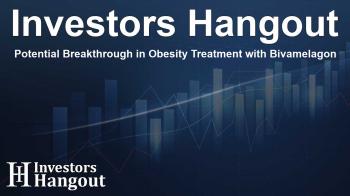Potential Breakthrough in Obesity Treatment with Bivamelagon

Rhythm Pharmaceuticals, Inc. Unveils Promising Trial Results
Rhythm Pharmaceuticals, Inc. (NASDAQ: RYTM) has made significant strides in the fight against rare obesity. The company has recently disclosed the topline results from its Phase 2 clinical trial of bivamelagon, an innovative oral drug targeting melanocortin-4 receptor (MC4R) agonism, specifically aimed at treating acquired hypothalamic obesity. This condition arises due to damage to the hypothalamus, a crucial brain region overseeing appetite and metabolism.
Clinical Findings
The results from the trial indicate that bivamelagon has facilitated statistically significant and clinically relevant reductions in body mass index (BMI) after 14 weeks of treatment. These outcomes are particularly noteworthy as they are in line with the reductions previously observed with setmelanotide therapy in similar patient groups during past studies.
Details of the Phase 2 Trial
In January 2024, Rhythm Pharmaceuticals in-licensed bivamelagon from LG Chem Ltd. The Phase 2 trial was robust, featuring a double-blind, four-arm, placebo-controlled design. Across various dosage cohorts, bivamelagon consistently demonstrated significant reductions in BMI from the baseline.
For instance, participants in the 600mg cohort experienced an impressive 9.3% reduction in BMI, supported by a p-value of 0.0004. Likewise, those in the 400mg cohort showed a 7.7% reduction with a p-value of 0.0002. Notably, even the 200mg cohort saw a 2.7% decrease (p-value=0.0180). In stark contrast, participants in the placebo cohort exhibited a 2.2% increase in their BMI over the same 14-week duration.
Comparative Effectiveness Analysis
A detailed post-hoc analysis unveiled that bivamelagon’s results were comparable to the reductions achieved with setmelanotide in previous trials under similar patient conditions and dosages. This analysis focused on participants from the setmelanotide studies who adhered to the criteria of study compliance and were not using concurrent GLP1 therapy. Crucially, patients enrolled in the Phase 2 bivamelagon trial were not on such therapy.
The mean BMI reductions for setmelanotide across two different trial phases were noteworthy, with reductions of 9.7% at 12 weeks and 10.5% at 16 weeks. In comparison, bivamelagon participants recorded mean reductions of 8.8% and 10.1% at 14 weeks across the 400mg and 600mg Cohorts respectively.
Hunger Scores and Overall Tolerability
The trial participants also reported substantial decreases in their hunger levels, as reflected in their 'most' hunger scores at the 14-week mark. Those in the 600mg and 400mg cohorts achieved mean reductions exceeding 2.8 points on a 10-point scale, indicating improved appetite regulation. Conversely, those in the placebo group reported an increase in their worst hunger scores, emphasizing the notable effectiveness of the drug.
Overall, bivamelagon exhibited a favorable safety and tolerability profile, suggesting that it may provide a viable option for patients battling this rare form of obesity.
Future Directions
Moving forward, Rhythm Pharmaceuticals is poised to engage with regulatory authorities in both the U.S. and Europe. The objective is to garner input on the design of a Phase 3 trial aimed at further developing bivamelagon for acquired hypothalamic obesity. The company intends to meet with the U.S. Food and Drug Administration (FDA) for an End-of-Phase 2 discussion and also seek guidance from the Committee for Medicinal Products for Human Use (CHMP) of the European Medicines Agency (EMA).
Additionally, Rhythm is working on refining the formulation of bivamelagon to enhance its tolerability before embarking on the next phase of testing.
Stock Performance Update
As of the latest trading session, RYTM stock has seen a remarkable increase of 31.1%, trading at $85.51. This uptick comes in light of the encouraging results presented from the recent clinical trial.
Frequently Asked Questions
What is rhythm Pharmaceuticals' recent development?
Rhythm Pharmaceuticals recently disclosed positive topline results from its Phase 2 trial for bivamelagon, targeted at rare obesity.
How effective is bivamelagon?
Bivamelagon has shown statistically significant reductions in BMI, outperforming placebo and indicating strong potential for treating acquired hypothalamic obesity.
What are the next steps for Rhythm Pharmaceuticals?
The company plans to consult with U.S. and EU regulatory bodies regarding a Phase 3 trial to advance bivamelagon in clinical development.
How did patients respond to bivamelagon in the trial?
Patients reported meaningful reductions in hunger scores and showed significant BMI improvements, demonstrating the drug's efficacy and tolerability.
What has been the market response to these developments?
Following the trial results, RYTM stock experienced a substantial increase of 31.1%, reflecting investor confidence in the future of bivamelagon.
About The Author
Contact Evelyn Baker privately here. Or send an email with ATTN: Evelyn Baker as the subject to contact@investorshangout.com.
About Investors Hangout
Investors Hangout is a leading online stock forum for financial discussion and learning, offering a wide range of free tools and resources. It draws in traders of all levels, who exchange market knowledge, investigate trading tactics, and keep an eye on industry developments in real time. Featuring financial articles, stock message boards, quotes, charts, company profiles, and live news updates. Through cooperative learning and a wealth of informational resources, it helps users from novices creating their first portfolios to experts honing their techniques. Join Investors Hangout today: https://investorshangout.com/
The content of this article is based on factual, publicly available information and does not represent legal, financial, or investment advice. Investors Hangout does not offer financial advice, and the author is not a licensed financial advisor. Consult a qualified advisor before making any financial or investment decisions based on this article. This article should not be considered advice to purchase, sell, or hold any securities or other investments. If any of the material provided here is inaccurate, please contact us for corrections.

